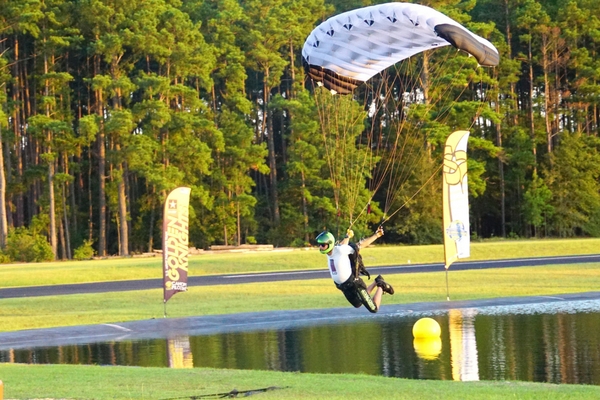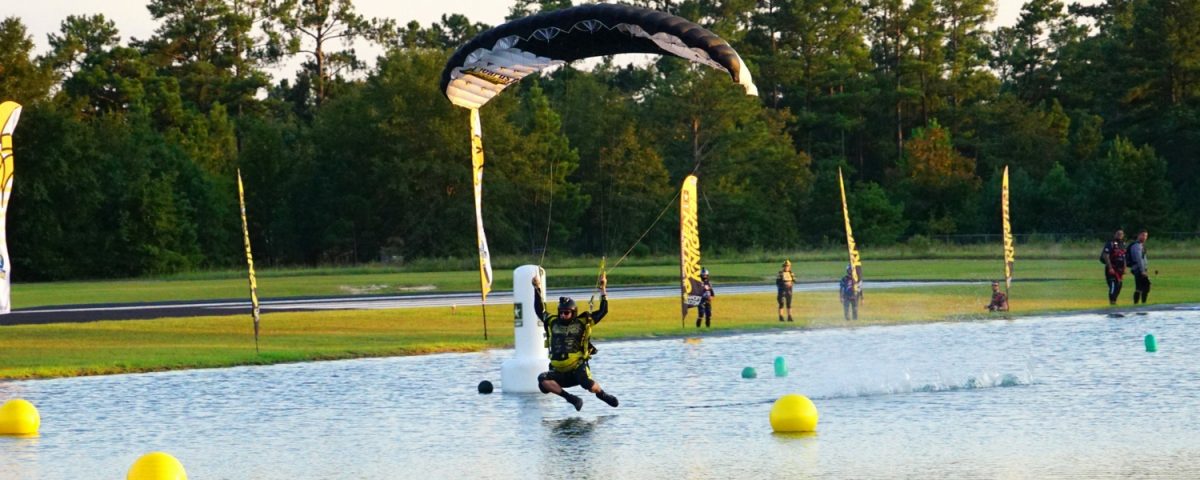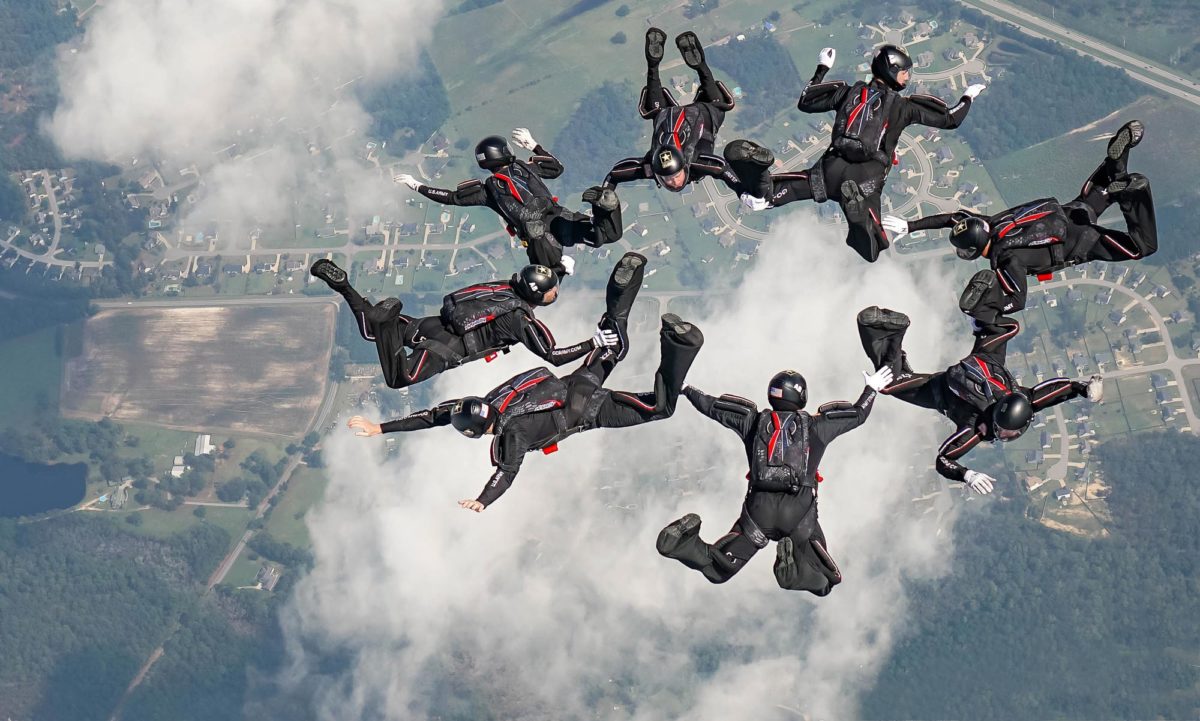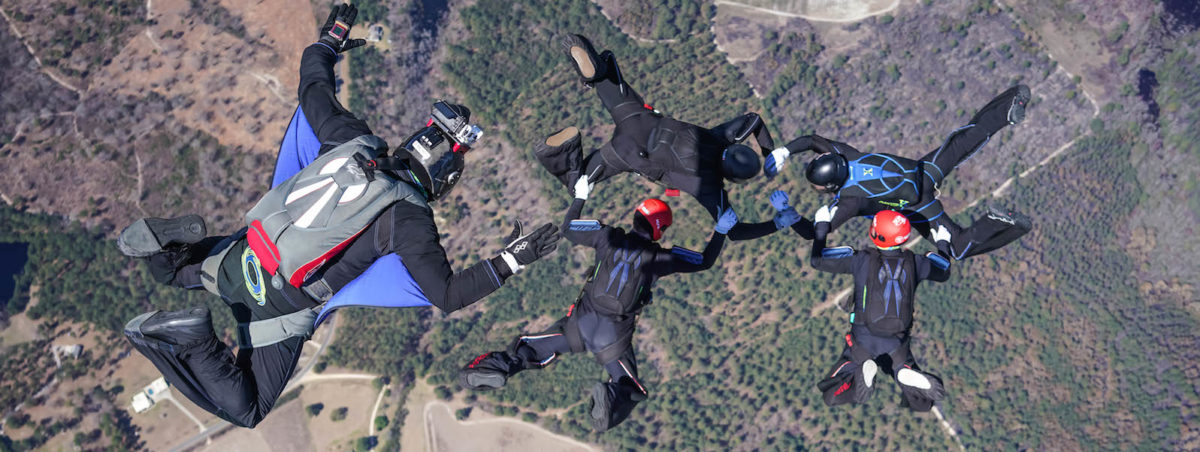Parachuting Championship Events Explained
Monday, April 15, 2024
- Team FlyXP
- 4/15/24
- 0
- General
If you’re a competitive person, you might be wondering, “Are there competitions in skydiving?” Yes, indeed – skydiving competitions have been around since the 1930’s, where Russian jumpers would demonstrate who could land closest to a given target. In 1951, the Federation Aéronautique Internationale (FAI) held the very first World Parachuting Championship with just five European teams competing in freefall style and accuracy landing.
Nowadays there are more than 10 different competition skydiving disciplines with countless parachute competition events year-round, National and even World-level competitions of all disciplines. Skydiving competitions are wonderful opportunities to gain experience, get to know the skydiving community internationally, and perfect your skills!

Competition Skydiving Disciplines
Skydiving is an ever-evolving sport that has grown exponentially over the last decade for various reasons including the increasing availability of indoor skydiving wind tunnels and obtaining insta-worthy content for social media. With the sport increasing in popularity, so have the skydiving disciplines – which can be split into two separate categories; freefall and parachuting. Here are the disciplines recognized on the National and World levels:
Parachute Events
- Accuracy
Skydivers will compete to land as close to the center of a target as possible. Competitors will exit the plane at 3,000 feet AGL and are scored based on the first point of contact with the target. For individuals, the closest one after 10 rounds wins!
- Canopy Formation (CF) Rotation
In canopy formation, the teams will perform a sequence of formations all while under canopy. A team videographer will record the canopy formations for the judges. The competitors will speed eight rounds linking themselves by taking grips with their hands or feet on the lines or risers of their teammate’s canopy. In 4-way rotation, the top competitor in the formation will drop grips and fly to the bottom of the formation as quickly as possible.
- Canopy Formation (CF) Sequential
In CF Sequential, there are 4-way, 2-way open, and 2-way ProAm teams. The teams will complete a sequence of formations as many times as possible within working time.
- Canopy Piloting (CP)
CP consists of nine rounds total; three rounds each in speed, distance, and accuracy. The canopy pilot’s goal in the speed rounds is to navigate through the boundaries of the course in the fastest time. During the distance rounds, the canopy pilot drags a toe in the water at the beginning of the course and then continues to fly down the course as far as possible. In accuracy, they will drag a toe through as many water gates as possible while landing in a specific accuracy zone. Canopy pilots win based on the most points awarded to the closest pilot and lose points if they do not stand up the landing.
- CP- Freestyle
Canopy piloting freestyle gives competitors three rounds to complete stylish moves over the swoop pond that are judged based on difficulty and how well they are performed.

Freefall Events
- 4-Way Formation Skydiving (FS)
Teams consist of six active members; four performers, an alternate, and a videographer to capture the video evidence of each competition jump. The 4-way team must complete a predetermined series of movements that are assigned each round to score points. There are a maximum of 10 rounds, each round consisting of about four to five formations that teams must build during freefall. Teams exit at 10,500 feet AGL and will have about 35 seconds to perform as many formations as possible to score the most points in that round – repeating the series to rack up points.
- 8-Way Formation Skydiving (FS)
Teams consist of 10 active members; eight performers, an alternate, and a videographer. The competition style is the same as in 4-Way, exit altitude is increased to 13,000 feet AGL giving them 50 seconds and there are double the amount of skydivers – increasing the difficulty. Skydive Paraclete XP is proud to be home to the 2023 8-Way FS Champions: GKXP8!
- 16-Way Formation Skydiving (FS)
Each jump is made from 13,000 feet AGL, giving 16 skydivers 50 seconds to perform a designated formation, sequence, or series of formation drawn from the dive pool. There are a maximum of six rounds in competition. Scoring style is the same.
- 10-Way Formation Skydiving (FS)
Each person on a team exits individually as fast as they can and the team will build their formation in the least amount of time possible. Each jump is made from 11,000 feet AGL and each formation must be held for at least five seconds. There are six rounds with different formations. The team with the lowest cumulative time wins!

- Vertical Formation Skydiving (VFS)
In 4-way VFS, teams will have four performers and one videographer. They will exit at 13,000 feet AGL, giving the team about 35 seconds of freefall to complete as many vertical formations as possible in a total of 10 rounds. Skydivers will be required to fly in various head-up and head-down formations to complete the jump. The team to complete the most formation in the given time overall wins!
- Mixed Formation Skydiving (MFS)
In 2-way VFS, teams are made up of two performers and one videographer. For eight rounds, teams will exit at 13,000 feet AGL, giving them about 35 seconds to complete as many mixed formations as possible in a belly, back, head-down, or head-up position. Scoring style is the same as VFS.
- Artistic Freestyle
Artistic freestyle teams include one performer and one videographer. Teams exit from 13,000 feet AGL and have about 42 seconds to perform. The competition is made up of compulsory rounds where teams complete four specific sequences of moves as well as free rounds where team’s choreograph their own freestyle routines. Scoring is based on difficulty and execution. Skydive Paraclete XP is proud to be the home of 2023 Artistic Freestyle Champions, XP Ascend!
- Artistic Freefly
Artistic freefly is the same as artistic freestyle, except freefly includes two performers and a videographer. Skydive Paraclete XP is proud to be home to XP Ascend FF, 2023 National Champions!
- Wingsuit – Acrobatic
The wingsuit acrobatic team consists of two performers and one videographer. The competition is made up of compulsory rounds where teams must complete a set of maneuvers together, as well as free rounds where the team must choreograph their own routine which is scored based on style, plan, and camera work. Teams have 7,500 vertical feet to perform.
- Wingsuit – Performance
There are nine rounds in total with three rounds each in speed, distance, and time. Wingsuit pilots must fly as fast as possible during the speed rounds, as far as possible in a horizontal line in the distance rounds, and stay in the competition window for the longest amount of time during the time rounds. The competition window is 1,000 meters (3,281 feet) measured vertically.
- Speed
As the fastest non-motorized sport in the world, speed skydiving competitors must orient themselves into aerodynamic body positions to reach the fastest speed during eight jumps. A speed measuring device is worn by the competitors to collect data for the judges. In this discipline, competitors can reach more than 300 mph in some cases. Wow!

2024 National Parachuting Championship at Skydive Paraclete XP!
What is the biggest skydiving competition? Well, other than the FAI World Championships, the USPA hosts the National Championships – where individuals and teams will showcase their skills to earn a chance to represent the US Parachute Team at the FAI World Championships!
We couldn’t be more excited to be one of the hosts of the 2024 USPA National Championships alongside Skydive Chicago. Skydive Paraclete XP will be hosting the Canopy Piloting National Championships from August 29th through September 4th, 2024 for Canopy Piloting and CP- Freestyle.
If you’re interested in competing or just want to see how skydiving competitions work and watch some epic canopy piloting skills, visit our website for more details on registration, directions, and local accommodations. Blue skies, happy training, and good luck to all of the rockstar competitors!
Copyright © 2025, Skydive Paraclete XP, All Rights Reserved.
DropZone Web Design & Marketing by Beyond Marketing, LLC
